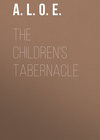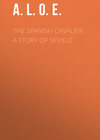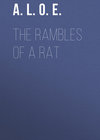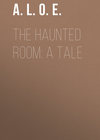Читать книгу: «The Children's Tabernacle», страница 4
IX.
Concealment
DORA felt very unhappy. She had broken the holy rest of the Lord’s day; she had repeated prayers without praying, heard God’s Word read without attending, had made a vain show of religion; and at last had worked and worked hard at her needle, as she might have done on any other day of the week. Dora had disobeyed what she knew to be the wishes of her mother, and then to hide such disobedience had uttered a lie to deceive her! The girl could not conceal from herself that she had done what was wrong – exceedingly wrong; that she had displeased a holy God, whose eyes are in every place beholding the evil and the good.
“Oh, what can I – what ought I to do now!” thought Dora, as slowly and sadly she went up to her own little room. Conscience gave an instant reply, “Retrace your steps as quickly as you can, own your fault to your mother, and ask forgiveness from God.” But Dora was very unwilling to do this; she was inclined to take a kind of half-way course.
“I need not say anything to mamma about what I have done,” thought Dora. “I will not touch my pretty work any more on Sunday; and to-morrow, as soon as I get up, I will unpick every stitch of what I have been sewing to-day. That will be a good punishment for me; yes, that will be the right kind of punishment for breaking the Fourth Commandment.”
Dora half satisfied her conscience by making this resolution to undo what ought not to have been done; but the little girl made a grievous mistake in supposing that any self-inflicted punishment can take away sin. We must go straight to the Lord for forgiveness, and ask it only for the sake of the Lamb of God, who suffered to take away guilt; and when we have sinned against our fellow-creatures, as well as against our Heavenly Father, we must honestly and openly confess to them what we have done, and ask their forgiveness. Dora shrank from doing this; she was extremely unwilling to own to her mother that she had been sewing on Sunday.
“Perhaps mamma would take away from me the making of the embroidered curtains altogether,” thought Dora, “and give it to Agnes instead; and then all the family would know the reason, and I should be lowered in the opinion even of little Elsie! Oh, how dreadfully ashamed I should feel, and what a bitter disappointment it would be to see the work in the hands of another, after I have taken such pains to draw out that beautiful pattern! Worst of all, Aunt Theodora would hear of my fault when we go to be with her at Christmas. She would be sure to ask why I had not embroidered the veil and the curtains, for she thinks that I embroider so well. Oh, I could not bear that the aunt whom I love so much – who loves me so much – should know what I have done! No, no, there is no use in speaking about the matter at all; I will punish myself by the tiresome unpicking, and then all will be right.”
Would all be right? Were Dora to punish herself ever so severely, would all be right? No, dear reader, no! self-punishment cannot wash away sin.
“Could my zeal no respite know,
Could my tears forever flow,
All for sin could not atone,
Thou must save, and Thou alone.”
Dora was only deceiving herself now, as she had an hour before deceived her indulgent mother.
In the evening, after tea-time, the family assembled again in the study. Their usual employment on Sunday evenings had been to sing hymns with their mother, each in succession choosing a favorite hymn; but the whooping-cough had for weeks past put a stop to all singing, and it had cost Mrs. Temple some thought to find a way of making the evening Sabbath hour as pleasant to her family as it had usually been. The searching in the Bible for types had been a new kind of occupation, and had made the afternoon seem less long to the young prisoners at home than it might otherwise have appeared during the absence of their mother at church. The family circle looked a very happy one by the light of the fire round which they gathered; for autumn was beginning, the weather, though not very cold, was damp; and the illness from which the children were recovering made warmth and dryness so desirable, that the fire was always lighted at sunset.
“I like when we sit so cosy together before the blazing fire!” exclaimed little blue-eyed Elsie, cuddling close to her mother. “I hope that Eliza won’t bring in the candles; no one wants candles to talk by. Agnes, you won’t cough so badly if you put your feet here on the fender; please, Lucius, give the fire a good stir, and make the red flames leap up and dance. Are we not a happy party!” she added, squeezing tightly her mother’s hand in both of her own.
Smiling faces gave the reply. There was but one face that wore no smile. Dora sat on the other side of her mother, but the girl had drawn her chair a little back from the half-circle before the fire, and held a hand-screen before her face, not really to protect it from the scorching blaze, but that it might not be seen by the fire-light. Dora was glad, though not for the same reason as Elsie, that Eliza did not bring in the candles.
X.
Dead Faith and Living Faith
“MAMMA, I’ve been trying to find a type; I’ve been looking all through my Bible pictures,” said blue-eyed Elsie.
“And did you succeed in finding a type, my darling?” asked Mrs. Temple, smiling at the gravity of the child, whom she thought scarcely likely to be able to discover the meaning of the most simple Scripture figure.
“I don’t know – I’m not sure,” said little Elsie; “but I’ve found two pictures – one in the Old Testament and one in the New Testament – and they are rather like each other; so, you know, dear mamma, it seemed as if one might be a sort of a type.”
“And what were your pictures about, Elsie, pet?” asked Lucius, stroking the hair of his youngest sister, of whom the schoolboy was very fond.
“One picture was of Elijah raising the poor widow’s son, and the other was of the Lord’s raising a widow’s son. These were two things like each other,” said Elsie; “but,” she added, shaking her curly head thoughtfully, “I can’t tell if there was any type.”
“I daresay that little Elsie is right, and that Elijah was a type of the Lord!” cried Lucius, “for did they not both fast forty days in the wilderness?”
“I thought that Elijah was rather a type of John the Baptist,” observed Agnes.
“Yes, he was so,” said Mrs. Temple. “Our Lord’s own words show that John, ‘the Voice crying in the wilderness,’ came in the spirit and power of the prophet Elijah, though John worked no miracle. Yet in the two instances which your brother and Elsie have noticed, the raising of the dead and the forty days’ fast in the desert, Elijah’s history shadows forth that of One far greater than himself. Has my dove Amy thought of any Scripture type?” said the mother, turning towards her young daughter.
Amy hesitated a little; she was always distrustful of herself, and in this was a great contrast to Elsie. Mrs. Temple smiled encouragingly upon her little girl. “I see that there is something in your head,” said the mother; “tell us, my love, what you have thought of. If you have made a mistake, I will try to set you right; we are at least likely to gain some increase of Scriptural knowledge by talking over such subjects as these.”
“I thought at first that I should never find out anything,” said Amy; “though you explained to us so much about types this morning, dear mamma, I felt quite puzzled when I tried to make out one for myself. At last a verse from the third chapter of John came into my mind, and I wondered whether our Lord Himself taught Nicodemus in it something about a type. Perhaps Nicodemus understood the Lord’s meaning, but I could not understand it – that is to say, not clearly – so I thought that I had better ask you about it, mamma.”
“What is the verse?” asked several voices at once.
Amy folded her hands reverentially as she repeated the sacred words once spoken by our blessed Redeemer. Mrs. Temple would never allow her children to gabble over carelessly any verse of Scripture. – “‘As Moses lifted up the serpent in the wilderness, so must the Son of Man be lifted up, that whosoever believeth Him should not perish, but have eternal life,’” (John iii. 14, 15.)
“Most certainly, our Lord spoke then of a most remarkable type,” said Mrs. Temple. “To what coming event in his own life did our Saviour refer in the expression ‘be lifted up’?”
“To His being lifted up on the cross,” said Amy, in a low tone of voice.
“And why was the Son of God lifted up on the dreadful cross?” asked her mother.
“That we – that all who believe in Him shall have eternal life,” replied Amy Temple.
“It was indeed as a type of this great salvation from eternal death that the brazen serpent was lifted up by Moses,” said the lady. “Do you remember what had happened to the Israelites to make the raising of the brass serpent needful to save them from destruction brought on by sin?”
As Amy did not immediately reply to the question, Elsie eagerly put in her word.
“You told us all about it last Sunday, mamma; I remember the story quite well. The people had been wicked, very wicked, and so fiery serpents came amongst them and bit them; and many – I don’t know how many – Israelites died, because no doctor knew how to cure them.”
“Were those deadly bites a type of sin whose wages are death?” asked Lucius.
“They were so, my son,” said his mother. “Man had no way of saving those who had received the deadly wound, so God himself showed Moses a way. The Lord bade him lift up on high a serpent of brass, and promised that whoso looked upon it should live.”
“I cannot imagine how mere looking could do the least good to a person dying of the poison of a snake-bite,” observed Agnes.
“The Almighty willed that it should be so,” said Mrs. Temple; “He willed that the look of faith should bring healing to a sick body, as the look of faith at a crucified Saviour still brings healing to the sin-wounded soul. When I read how my Lord says, through the prophet Isaiah, ‘Look unto Me, and be ye saved, all the ends of the earth’ (Isaiah xlv. 22), I think of the brazen serpent, and know that I have but to believe in Christ and be saved.”
“What do you mean by the look of faith?” inquired Agnes.
“Faith is simply believing,” replied Mrs. Temple. “To look to Christ is to believe that He is able and willing to save us, and that none can save us but He.”
Dora, who had chosen, as we know, to sit a little drawn back from the circle, and with a screen in her hand, now dropped the screen on her lap, and leant forward, so that the red flickering gleam of the fire-light shone on her face as she anxiously asked, “Then are we quite, quite safe, sure never to be punished for anything evil that we have done, if only we have faith that the Lord will save us?”
“Yes, if the faith be real, living faith,” replied Mrs. Temple.
“Are there then two kinds of faith?” inquired Lucius.
“Yes,” answered his mother; “we read in the Bible of two kinds of faith or belief – one dead and one living.”
“I cannot understand that at all,” said Amy.
“I will try to explain,” said the lady “and I ask you, my children, to give me your full attention, for this is a matter of the greatest importance. You all believe, do you not, that there is an Emperor of Germany?”
“Yes, yes,” replied the children: and Elsie added with a little nod, “I believe there is such a man, though I never have seen him.”
“Now does your belief in the existence of the Emperor – that is, your faith in it – does it make the smallest difference in your actions, or words, or feelings?” inquired Mrs. Temple.
“No, why should it?” cried Lucius.
“The Emperor does not care for us; he knows nothing about us,” said Elsie.
“Then your faith in the Emperor is a dead faith, it has no effect on your hearts,” observed Mrs. Temple. “And this is the kind of faith which many persons, alas! have in the Lord. They believe in a careless sort of way that Christ once lived in the world, and died on the cross, but they believe only with the head, not with the heart. And this is dead faith, a kind of faith which never can save us.”
“But what is living faith, then?” asked Amy.
“When our belief makes us really love Him who first loved us, – when the thought of Christ’s dying for sin makes us hate sin, that cost Him so dear, then our faith must be living faith; and thus looking to the Lord we are saved.”
Dora sighed and drew her head back again into the shadow. Hers was not a faith that had kept her from sin – hers was not a faith that made her now obey the whisper of conscience, confess her fault to her mother, and make what amends she could for what she had done.
“Depend upon it, that when an Israelite had been cured of his wound by looking at the brazen serpent, he did not go and stroke and play with the fiery reptile that had bitten him,” observed Lucius, who had the clearest head amongst the party, and best entered into the meaning of types.
“No, he would run away from the horrid creatures, or try to kill them; he would put his foot upon the fiery serpents and crush them – crush them,” cried Elsie, stamping her little foot on the hearthrug, to add force to her words.
“So every one who has living faith dreads and hates sin, and tries to destroy it,” observed Mrs. Temple. “We will not carelessly trifle with it if we believe from our hearts that our blessed Redeemer suffered because of our sins.”
“What a very holy thing was that brazen serpent which Moses set up on a pole!” exclaimed Amy. “Did he not afterwards put it into the ark, that the Israelites might carry it about with them wherever they went, and treasure it as they did the tables of stone on which the Commandments were written?”
“We do not read of Moses putting the brazen serpent into the ark,” replied Mrs. Temple; “but the Israelites must have carried it with them in their wanderings through the desert, and have taken it into the Promised Land, for we read of the brazen serpent being greatly honored by the people more than seven hundred years after it was lifted up.” (1 Kings xviii. 4.)
“It was quite right that the Israelites should honor it very, very much,” cried Elsie, “because the brazen serpent had saved so many people from dying.”
“You mistake, my child,” said her mother. “The brass image had no power in itself to save a single creature from death; it was of no use at all but as a means appointed by God. The brazen serpent was a type of salvation; and when the Jews took to burning incense to the mere type, that is, when they paid to it the honor which is due to God alone, they fell into sin.”
The younger children looked surprised; and Amy murmured, “Then can even a holy thing lead men to do what is wrong?”
“Men do wrong, exceedingly wrong, when they put anything, however holy it may seem in their eyes, in the place of God,” observed Mrs. Temple. “When good king Hezekiah saw that his people were honoring the brazen serpent too much, what do you think that he did?”
“Perhaps he locked it up, so that no one could get at it,” cried little Elsie.
“Hezekiah took a much stronger measure than locking up the image,” said her mother. “The good king broke the brazen serpent into pieces, and called it Nehustan, or a piece of brass, to show both by word and deed that the most holy and interesting relic may lead to the sin of idolatry, if it draw away our thoughts and our hearts from the Lord who alone can give us salvation.”
XI.
Leprosy
“AS we seem to be giving in our types youngest by youngest, it is Dora’s turn now to tell us which she has chosen,” said Lucius.
“Ah! Dora will have found out the most interesting type of all, Dora is so clever!” cried Elsie, who had great faith in the intelligence of the brighter of the twins.
All eyes were turned towards Dora as she sat in the shadow, but Dora’s own eyes were bent on the hearthrug. She had been so much taken up on that Sunday, first with her embroidery, then with the conversation between her mother and Lucius, and the painful struggle in her own mind with an upbraiding conscience, that Dora had not even thought of looking out for a type in Scripture.
“What have you chosen, Dora?” asked Lucius.
“I have not chosen any type yet, I have not had time,” stammered out Dora, confused and mortified to find herself behind even little Elsie, who looked astonished at the words of her sister.
“Not time! why, you have had as much time as any of us,” said Agnes. “What were you doing all the afternoon while mamma was at church?”
“Nothing particular,” said Dora, with a little confusion. Again a pang shot through the heart of the conscious girl for she knew that she was again staining her lips with untruth.
“You don’t mean to say that you were sitting from two o’clock till five, with your hands before you, and thinking about nothing at all,” said Lucius.
“Perhaps Dora was reading that interesting book about the poor French Protestants,” suggested Amy.
Dora did not speak. She was too well pleased, alas! that her family should believe that she had been thus engaged, though she knew that she had not so much as opened the volume in question.
“It would have been better, my love, for you to have entered into the occupation which interests your brothers and sisters,” said Mrs. Temple, in a tone of gentle reproof. “Even reading a nice Sunday book like the one Amy mentioned may become a selfish amusement, if it keeps us from adding a little to the general pleasure.”
“I never knew Dora take such a reading fit before,” muttered Lucius; “she generally likes to use her fingers more than her head.”
The remark was a very commonplace one, yet it added to Dora’s confusion. Mrs. Temple, noticing her daughter’s look of annoyance, though she attributed it to a different cause than the true one, turned the conversation by asking Agnes whether she had thought of a Scriptural type.
“Yes, mamma,” replied Agnes. “I believe that leprosy is a type of sin, and the cure of lepers a type of the cure of sin just as the looking up at the brazen serpent was a cure for the deadly bites.”
“You are perfectly right, my dear girl,” said her mother.
“What is leprosy?” asked little Elsie
“A dreadful kind of illness,” replied Agnes; and as she seemed disinclined to say more, perhaps from fear of bringing on her cough by speaking, her mother continued the description of this terrible type of sin.
“This frightful malady is still well-known in the East,” said Mrs. Temple. “Your uncle, who came lately from India, has told me that he has seen many poor lepers there. The leprosy makes them loathsome to the eye; it creeps over their bodies; it wastes their flesh; when it fastens on their hands, it will make the very fingers drop off!”
“Oh, how dreadful!” exclaimed all the children.
“Dreadful indeed, but not so dreadful as the sin which it represents,” said their mother sadly; “for the soul’s sickness is more dangerous, its effects infinitely more lasting.”
“I don’t quite see how leprosy is a type of sin,” observed Amy.
“I think that we are led to believe it to be such by the very particular commands regarding it which we find in the law of Moses,” said Mrs. Temple.
“Did poor people with leprosy never get well again?” asked Elsie, with pity expressed on her round little face.
“Yes, they did sometimes recover,” said her mother, “but not by such means as are used in cases of other sickness. Not a doctor, but a priest, was to judge whether the leper were really cured, or, as it was called, clean; and he had to bring a special offering to be sacrificed to the Lord.”
“I suppose the offering was that sheep which we see in the picture?” said Elsie, for the illustrated Bible had again been brought and placed upon Mrs. Temple’s knee, and the firelight was sufficiently bright to show a picture representing a cured leper coming to the high-priest, to find which illustration Mrs. Temple had turned over the pages.
“That picture shows but a part of the offering,” replied Mrs. Temple. “When the candles come in, I will read to you from the ‘Pictorial History of Palestine,’ written by the famous Dr. Kitto, a description of a very peculiar ceremony which took place before the sheep and two rams were slain as a sin-offering.”
“Ah! here come the candles – just when we want them!” cried Elsie, as Eliza made her appearance.
“I’ll get Dr. Kitto’s big book!” exclaimed Lucius, jumping up from his seat by the fire.
The candles were placed on the table near enough to Mrs. Temple to enable her to read without quitting her warm seat, but merely turning her chair round to the table. She then read aloud the following extract from the work of the learned doctor:
“‘When a person was reported to be free of his leprosy, a priest went out of the camp and subjected him to a very strict examination. If no signs of the disorder appeared upon him, the priest sent a person to bring two living birds (doves or young pigeons), cedar wood, scarlet wool, and hyssop, with which he performed the ceremonies of purification, to admit the party to the privileges of the Hebrew Church and communion.’”
“What does that mean, mother?” ashed Lucius.
“That the man was no longer to be cut off, as were lepers in Israel, from worshipping the Lord within the camp, or mixing with the rest of the people,” replied Mrs. Temple.
“Oh, mamma, might not a poor leper do that!” exclaimed Amy. “To be shut out from praying with one’s friends and relations would be almost the worst trial of all!”
“Remember, my child, that the dreadful disease was infectious; there was need of the greatest care lest it should spread in their camp. Lepers had to wear a particular dress, and to live apart from all who were yet in health. If any one drew near to a leper unawares, the afflicted one had to cry out ‘Unclean! unclean!’”
“I don’t think that I will ever again complain of being shut up from friends and playmates because of this whooping-cough,” cried Lucius. “It is disagreeable enough to be kept as we are even from going to church, but fancy what it would be to have to cry out ‘Unclean! unclean!’ if any one chanced to come near us!”
“Please, mamma, go on with the account of what the priest had to do with the two birds which he sent for when he found that the leper was quite well again,” said Amy.
Mrs. Temple continued her reading:
“‘He slew one of the birds, and received its blood in an earthen vessel. Into this he dipped the cedar wood, the scarlet wool, and the hyssop, and therewith sprinkled seven times the once leprous person. The other bird was then permitted to escape, as a symbol that the man was now free of his leprosy.’”
“Oh, how joyful the bird must have been when allowed to fly free up – up high into the air!” exclaimed Elsie.
“Not more glad than the poor cleansed leper, of whom that bird was a type,” observed Mrs. Temple. “Think of his joy at being free to return to his family – his wife and his children; and his thankful delight when worshipping once more with his former companions in the court of the Tabernacle of his God!”
“It seems to me that there is a verse in one of the Psalms which shows that David had the cleansing of a leper in his mind when he prayed to the Lord to forgive him his sin,” remarked Lucius.
“I was just thinking of the same when mamma read about the hyssop,” said Amy. “It made me feel sure that Agnes was right when she chose leprosy as a type of sin.”
“What is the verse to which you allude?” asked the mother.
Lucius was the one to reply, but the lips of Amy silently moved, as she repeated the same verse to herself from the fifty-first Psalm – “‘Purge me with hyssop, and I shall be clean; wash me, and I shall be whiter than snow!’”
“Oh, mamma! I remember the story of the poor leper who came to the Lord Jesus,” said Elsie, “and how he cried, ‘Lord if thou wilt, thou canst make me clean!’”
“How much more deeply interesting is the Saviour’s reply, ‘I will, be thou clean,’ if we look upon leprosy as a type of sin,” observed Mrs. Temple. “The Lord was able and willing to heal, not the poor man’s body alone, but also his soul; and make him free from all stain of sin as well as from all taint of disease.”


















